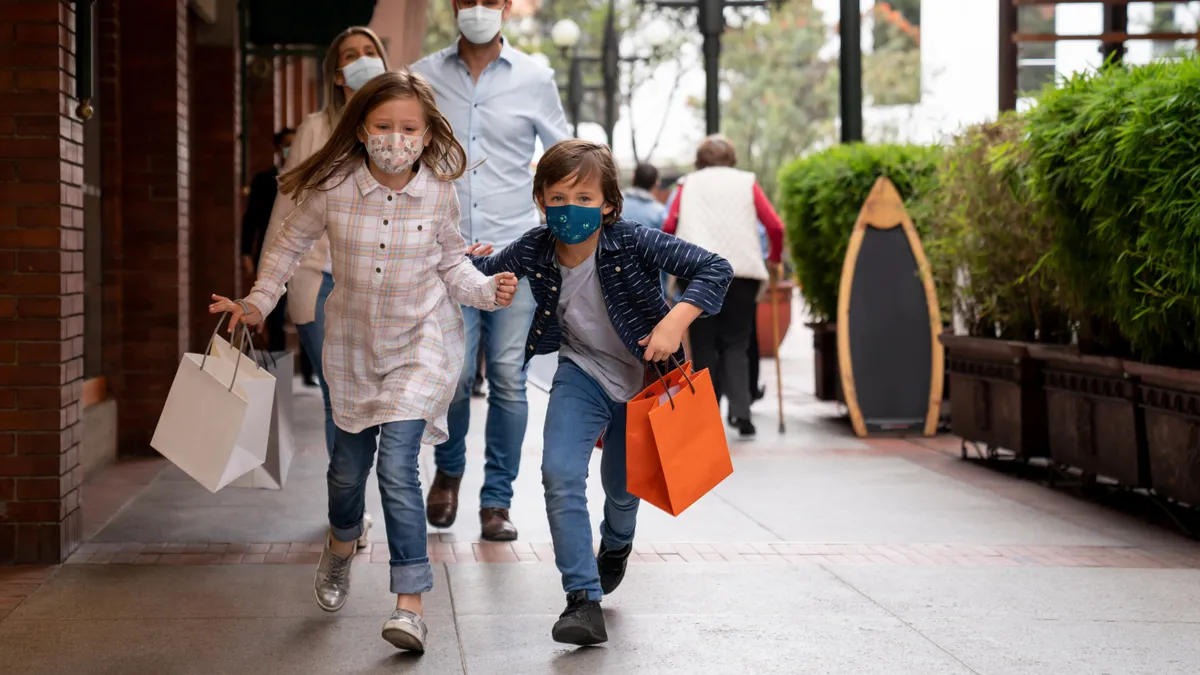In a different year, retailers may have been able to breathe a sigh of relief upon witnessing a healthy sales rebound in September, after enduring months of misery in their top and bottom lines.
But this is a year defined by the COVID-19 pandemic, which has ushered in a recession, undermined employment and disrupted global supply chains. To buy more time, the industry is embarking on the holiday season earlier than ever this year, but, despite the respite evident in September, retailers can't escape the prevailing challenge of the moment — an unprecedented level of uncertainty.
"September provides a ray of sunshine as we enter the golden quarter and retailers will be hoping the good weather will continue," GlobalData Retail Managing Director Neil Saunders said in emailed comments. "In our view, the numbers to date show the holidays will not be a disaster. Far from it. However, we caution that there are a lot of unknown variables that could quickly cloud that outlook and completely change the forecast."
The good news
The pandemic has prevented many U.S. consumers from enjoying their summer the way they like to, with sports, entertainment, travel and dining out (at least indoors) not an option. That has left their bank accounts with more money just as they're contemplating what to do at the holidays, bolstered in many cases by the government's $3 trillion pandemic stimulus package.
"In practice, there is still momentum in the consumer economy for several reasons," Saunders said. "First, a large group of consumers saved their various stimulus payments and so there is a pool of money that is still trickling into retail and boosting spending. Second, a lot of Americans are saving money by not commuting, vacationing and socializing and some of this is being transferred into retail. Third, as the economy continues to open, there is more activity in retail with consumers going out to shops and spending money."
Through promotions and marketing, retailers are also having some success jump-starting holiday shopping, helped along by Amazon's delayed Prime Day sales event, Saunders noted. Retailers, or at least some retailers, benefit from all that, and likely did in September, analysts say.
Even apparel, despite yet more year-over-year declines, recovered from earlier months, demonstrating "the strongest August to September gains for clothing retail and department stores, which will be heartening for these retailers despite the figures still being significantly down versus Sept 2019," Alex Fitzgerald, principal in Kearney's consumer practice, said in emailed comments.
The holidays could also push shoppers toward new clothes and footwear, according to Coresight Research, which recently ran a 10.10 retail event on Oct. 10. A Coresight survey found that 40.6% of respondents indicated interest in shopping that day and 73.1% indicated interested in shopping on Amazon's recent Prime Day. Clothing and footwear rose to the top in that research, with 48.8% of respondents saying "they would browse or buy apparel or footwear during the shopping festivals," according to emailed comments from Coresight CEO Deborah Weinswig.
Moreover, the boom in buying for the home isn't over, according to Coresight. "Home improvement retailers should continue to lean into BOPIS to capitalize on this craze — for example, Home Depot in [its] most recent quarter saw digital sales increase 100%, with 60% of those BOPIS or home delivery orders fulfilled by stores," Weinswig said.
The bad news
The government's failure so far to renew its pandemic-related support to consumers and businesses, which padded pockets and buoyed employment, could mean that the stimulus's contribution to September's sales disappears in coming months.
That's especially true for less wealthy consumers and any retailer that caters to them. The pandemic is exacerbating the already widening income gap in the U.S., and that will mean winners and losers in retail, experts say.
"[T]he consumer market is becoming increasingly polarized between those who are financially secure and able to spend, and those who are having to budget and restrain from buying," Saunders said. "At the moment the dynamics from the fortunate group are outweighing those who are less fortunate. This polarization is one of the reasons why budget chains are doing particularly well at the same time as big-ticket purchases at home stores are soaring."
Another dark cloud over the holidays is the trajectory of the pandemic, which appears to be surging again in areas of the world where it seemed to be contained, including in the U.S. Despite that, Anthony Fauci, M.D., director of the National Institute of Allergy and Infectious Diseases, told news program 60 Minutes on Sunday that it would have to get much worse to warrant another shutdown.
Nevertheless, retailers are bracing themselves for a falloff in shopping, whether or not stores are allowed to remain open. E-commerce, and the BOPIS services that make online shopping easier and faster, are expected to make up for an expected dropoff in store-based shopping. Such operations threaten margins, at a time when many consumers may be more reliant than ever on promotional holiday prices. All told, while September's retail performance holds some hope, it offers very little clarity.
"In terms of consumer spending, a great deal of uncertainty exists, with the overall financial security of the consumer as well as the virus itself," Fitzgerald warned. "For retailers this uncertainty rests on the importance of the holiday shopping season, which has already started. It was kicked off by Prime Day, and other retailers followed suit. The extended deal season means that retailers offering multiple sales can test the market and learn from them iteratively. Retailers will have a lot to iron out in the coming months with returns, curbside pickup, and other Covid-related consumer demands."























